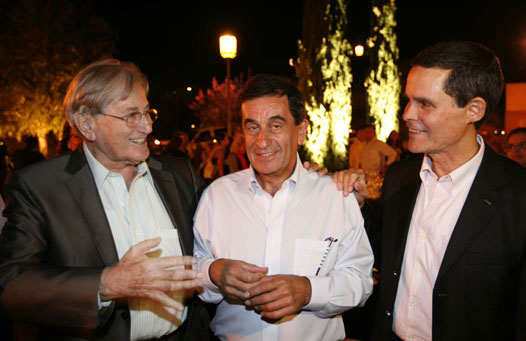Teva mourns the loss of founder Eli Hurvitz
From a humble start as a test tube washer for a chemical laboratory in the early 1950s, to the founder and CEO of the world leader in generic drug sales, Eli Hurvitz – who died in November 2011 at the age of 79 – was the quintessential Israeli pioneer.

Born in Jerusalem in 1932, before the state was founded, Hurvitz wasted no time enlisting in the Israeli Defense Forces during the War of Independence in 1948, even though he was only 16-years-old.
Following the war, he continued pursuing the Zionist dream and joined Kibbutz Tel Katzir, not far from the Sea of Galilee in the northern part of Israel. It was there that he met Dalia Solomon, whom he would marry in 1953. Hurvitz subsequently studied economics at the Hebrew University and worked part-time for Assia Chemicals Laboratories, where Dalia’s father was the manager.
It soon became clear that Hurvitz had greater ambitions than washing dishes at Assia, and he rapidly began moving up the executive ranks, using his economics background to engineer several mergers, which ultimately resulted in him being appointed as CEO of Teva Pharmaceutical Industries in 1976
Hurvitz credited the Arab trade boycott of Israel, which made many drugs unavailable in Israel, for sparking Teva’s expertise in developing generic drugs. A 1967 Israeli law allowed companies to copy a protected drug if the foreign patent holder didn’t market the item in Israel. The subsequent U.S. Hatch-Waxman Act of 1984, which allowed the sale of a generic drug if its manufacturer could prove that it was chemically equivalent to the original drug and broke no patents, allowed Teva to move into North American market.
In addition to his role as CEO of Teva, Hurvitz was active in multiple spheres of Israeli industry. He served as chairman of the Israel Export Institute from 1974 to 1978 and, in 1981, became president of the Israel Manufacturers Association, a position he held until 1986 when he was appointed chairman of the board of Israel’s Bank Leumi. Other positions for the busy Hurvitz included chairman of the Jerusalem Development Authority, director of Koor Industries, and chair of the Israel Democracy Institute.
Hurvitz also was active in Israeli higher education, serving as a member of the board of governors of Tel Aviv University and as chairman of the Executive Committee of the Weizmann Institute of Science. He held honorary doctorates from the Technion Israel Institute of Technology and Ben Gurion University of the Negev, as well as from the Weizmann Institute and Tel Aviv University.
Perhaps his greatest public achievement was receiving the Israel Prize in 2002 for “lifetime achievement and special contribution to society and the state of Israel.” Three years later, he was voted the “85th greatest Israeli of all time by the Israeli news website Ynet. In 2008, he was also voted the third most respected manager in the Israeli market. Prime minister Benjamin Netanyahu has called Hurvitz one of the country’s great industrialists. “Israeli initiative and the Israeli spirit had no better ambassador,” he declared.
Hurvitz stepped down as CEO of Teva in 2002 but remained the company’s chairman until he retired in 2010. He passed away on November 21, 2011 after a long fight with cancer. In one of his final statements to the press, he told the Israeli newspaper Yediot Ahronot, “I am not the type to surrender. That is how it was in business, and that is how it is with the illness.”
Hurvitz is survived by his wife Dahlia; three children, Vered, Dafna and Haim; and nine grandchildren.
Design and production: Stern Visual Communications, http://www.stern.org.il
Content development: Blum Interactive Media, http://www.bluminteractivemedia.com